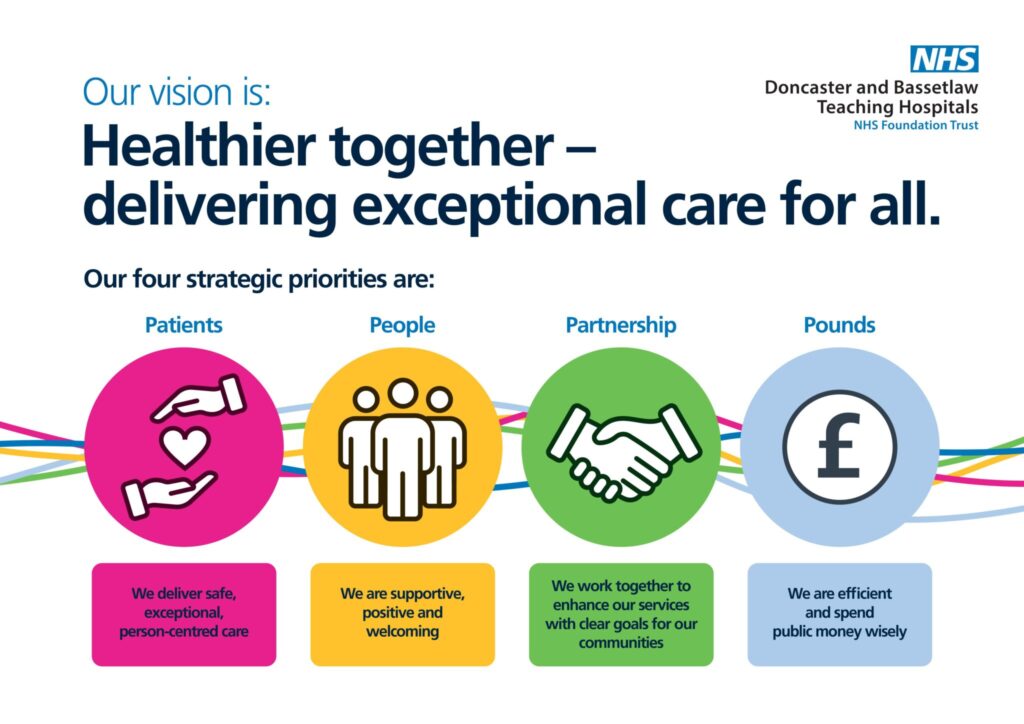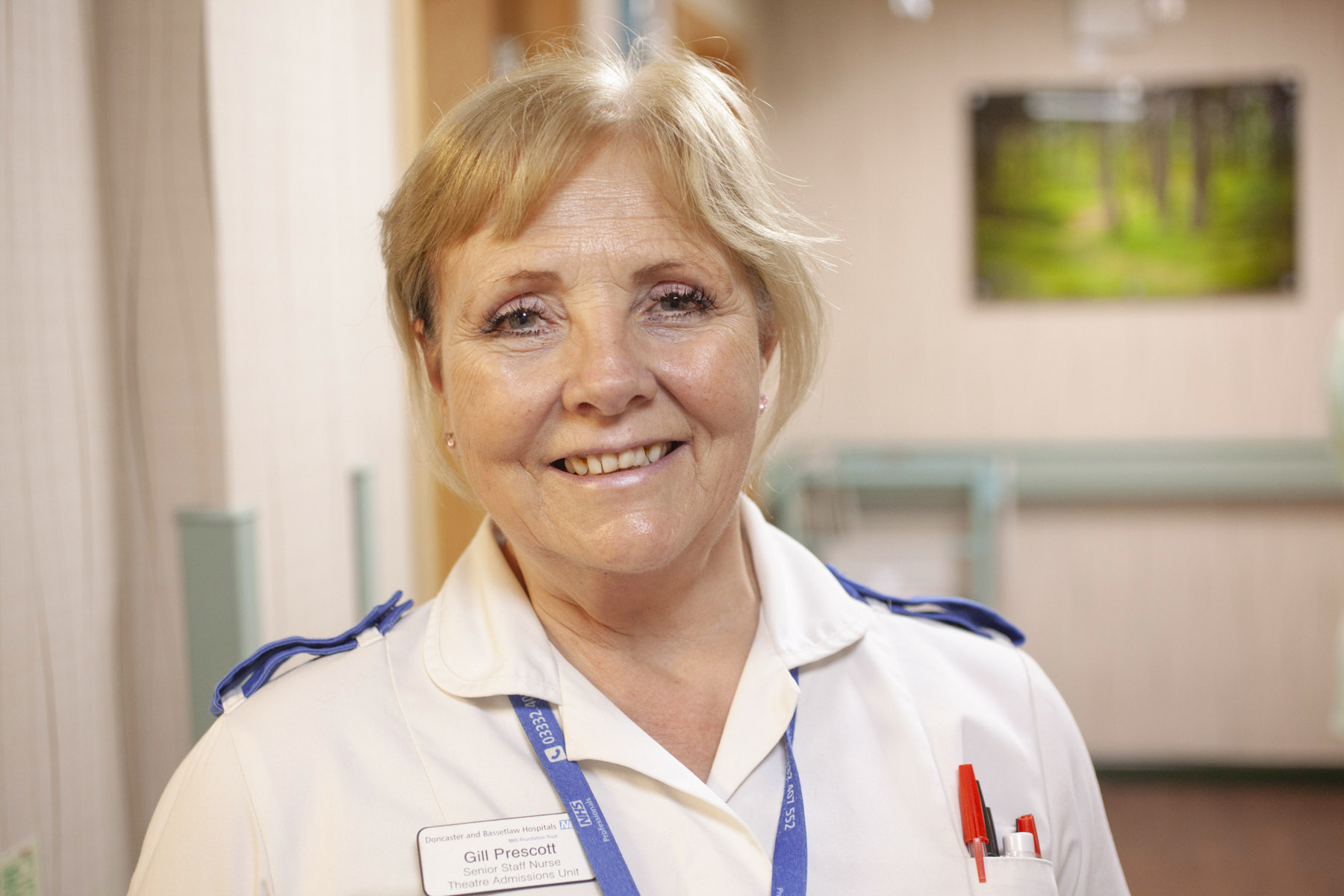There are a number of sections within this document. Using the links below, or to the side, you can skip to specific sections.
- Introduction
- Activity and Performance
- People
- Quality
- Finance
- System Working and Strategic Development
- Digital and Data
Jargon busting:
Despite our best efforts there may be a number of acronyms as well as NHS jargon in the our Operational Plan for 2024/25. To help, we have created this handy glossary of terms.
If you need this page in another language, please head to: https://translate.google.co.uk. For more accessibility options and information, please visit: https://www.dbth.nhs.uk/a-z/accessibility/
Introduction
Doncaster and Bassetlaw Teaching Hospitals NHS Foundation Trust (DBTH) is one of Yorkshire’s leading acute trusts, serving a population of more than 440,000 across South Yorkshire, North Nottinghamshire and the surrounding areas.
Hosting three main hospital sites and a number of additional services, the Trust is one of only five Teaching Hospitals in Yorkshire.
A modern and forward-facing Trust employing over 7,000 members of staff, the hospital provides a full range of local hospital services across the following sites:
Doncaster Royal Infirmary (DRI)
A large acute hospital with over 600 beds, a 24-hour Emergency Department (ED), and trauma unit status. In addition to the full range of district general hospital care, DRI also provides some specialist services including vascular surgery. It has inpatient, day case, diagnostic and outpatient facilities.

Bassetlaw Hospital in Worksop (BH)
An acute hospital with over 170 beds, a 24-hour Emergency Department (ED) and the full range of district general hospital services including a breast care unit and renal dialysis. Bassetlaw has inpatient, day case and outpatient facilities.

Montagu Hospital in Mexborough
A small non-acute hospital with over 50 inpatient beds for people who need further rehabilitation before they can be discharged. There is a nurse-led minor injuries unit, open 9am to 9pm. It also has a day surgery unit, renal dialysis, a chronic pain management unit and a wide range of outpatient clinics. Montagu is the site of our Rehabilitation Centre, Clinical Simulation Centre and the base for the abdominal aortic aneurysm screening programme.

Montagu has recently received multimillion pound investment in 2022- 2025 and has seen developments of a Community Diagnostic Centre Endoscopy Unit and Multifunction Clinic Rooms and Training Facilities, Montagu Elective Orthopaedic Centre “go live” in 2023. A new imaging unit for the CDC will also be built on site in 2024, commencing services Spring 2025.
We also provide outpatient and other health services at Retford Hospital including clinical therapies, medical imaging, audiology and screening.

In this section:
Please note, you can skip to specific sections of this document.
Approach to developing the Operational Plan for 2024/25
DBTH started its planning cycle a little earlier this year and established a dedicated team to lead the planning period and work on service developments throughout the year. New governance arrangements were put into place from October 2023 with a Planning Steering group overseeing DBTH Annual Plans preparations.
The Planning and Service Development team held engagement sessions with divisions and departments in November 2023 to explain the refreshed templates and planning process. A well-received Divisional Planning Priorities Sharing workshop was held 18th December 2023, with a similar Corporate department workshop at the end of January 2024.
Annual Plans were drafted throughout January to February with an extended Trust Executive Group meeting held on 7th February 2024 which gave an output of 20 priority areas of focus for the trust, which were prioritised to the following Transformation Programme by the Executive Team and aligned to the NHS Operational Planning Guidance which was published at the end of March 2024 and also with the South Yorkshire and Nottingham and Nottinghamshire ICBs Joint Forward Plans and Place Plans. Via a thorough Triangulation and Confirm and Challenge process the Trust has ensured all plans are robust to deliver quality care to patients.

Since the conclusion of our previous Trust strategy in 2022, DBTH, and the wider health system, has evolved significantly, and as such we believe the Trust requires a vision which responds to the dynamic healthcare landscape whilst maintaining our commitment to providing exceptional care.
At our Board of Directors meeting which took place on 7 May, the following statement was approved:
- Healthier together – delivering exceptional healthcare for all
This is underpinned by four strategic priorities, which are:
- Patients: We deliver safe, exceptional, person-centred care.
- People: We are supportive, positive, and welcoming.
- Partnership: We work together to enhance our services with clear goals for our communities.
- Pounds: We are efficient and spend public money wisely.

Our people are the key to delivering these objectives and our immediate collective challenge is to improve staff retention and attendance through a systematic focus on all elements of the NHS People Promise.
As we deliver on the NHS 2024/25 Operational Planning objectives we must continue to narrow health inequalities in access, outcomes and experience, including across services for children and young people. And we must maintain quality and safety in our services, particularly in maternity services.
The NHS has an important role in supporting the wider economy and our actions to support the physical and mental wellbeing of people will support more people returning to work.
Key areas of focus for the Trust remain recovery of our services to 19/20 levels and ensuring best use of services, Getting it Right First Time and enabling patients to have improved access to the right care across the system in a timely manner. Divisions ensured plans were in alignment to the planning guidance received which can be accessed via: 2024/25 priorities and operational planning guidance (england.nhs.uk)

Collaborative Working
DBTH will continue to work collaboratively with partners and stakeholders across Place (s) and ICB (s) with the overall priority in 2024/25 remaining to recover core services and productivity to 19/20 levels and to improve patient outcomes and experience we must continue to:
- Maintain our collective focus on the overall quality and safety of our services, particularly maternity and neonatal services, and reduce inequalities in line with the Core20PLUS5 approach
- Improve ambulance response and A&E waiting times by supporting admissions avoidance and hospital discharge, and maintaining the increased acute bed and ambulance service capacity that systems and individual providers committed to put in place for the final quarter of 2023/24
- Reduce elective long waits and improve performance against the core cancer and diagnostic standards
- make it easier for people to access community and primary care services, particularly general practice and dentistry
- Improve access to mental health services so that more people of all ages receive the treatment they need
- Improve staff experience, retention and attendance
We will continue to use a Quality Improvement and Innovation approach with partners to fulfil the wider health priorities set out in the Operational Planning Guidance 2024/25 in line with our Quality Improvement and Innovation (QII) Strategy.
In 2023 the Qii department was restructured to enable more Qii practitioners / Business partners to be recruited to support divisions and departments more directly. This realignment of resource increased the Qii engagement from 879 people in 2022 / 23 to 1,644 in 2023 /24.
The team consists of 5.6WTE and the main priorities for the department in 2024 / 25 are:
- Align Qii Business partners to every division.
- Support all transformation board (as agreed by the Executive Directors) improvement actions.
- Create a faculty of trained level 2 coaches within DBTH.
- Be custodians of the A3 lean improvement methodology.
- To refresh the Qii Strategy in line with NHS impact.
- New ways of working are co-produced (Patients, our people and Partners)
- Qii is embedded in the way we do work at DBTH.
- We are recognised for the effectiveness of our improvement work.
- Tangible benefits are realised across the 4 domains of Quality, Morale, Delivery and Use of Resources.
- We use plain language to describe the methods and actions.
Engagement with the Qii team is planned to be achieved in 4 main ways. These are through projects that have been identified by the Executive team, projects identified via Qii business partners directly supporting the divisions and utilising the Qii level 2 trained faculty and support for local improvement projects identified through local huddles and by offering Qii training and coaching to all staff. Through these routes the Qii team are aiming to engage with 1,625 colleagues a year (representing 25% of the organisation).
As a Trust we will also continue the implementation of our recently published Research and Education – The Research and Innovation (R&I) Strategy was launched in July 2023 shortly followed by an Nursing Midwifery and Allied Health Professional (NMAHP) R&I framework (Autumn 2023).

The Research and Innovation Strategy 23-28 is supported by a detailed delivery plan with comprehensive core programmes by year.
Research outputs that are ranked as high quality when evaluated under the Research Excellence Framework (REF is a framework used by Higher Education Institutions (HEIs) to support allocation of the £2billion awarded to HEIs per annum) is a Key Performance Indicator (KPI) that we are striving to continuously deliver.
The following KPIs – 6% of the workforce with Honorary Academic Contracts and £200K of Research Capability Funding is what we are working towards by 2028, which align to our ambition to become a University Teaching Hospital.

Planning for the Future
We also need to plan for, and take steps towards, transforming the way we deliver care, and create stronger foundations for the future. Improving health and joining up care – Systems are asked to work together to build on their initial Joint Forward Plans (JFPs) and set out the steps they will take to address the most significant causes of morbidity and premature mortality, and improve the co-ordination of services to reflect the growing prevalence of multi-morbidity, including steps to:
- expand evidenced-based approaches to population health, focusing on a healthy start to life, prevention, self-care and better management of long-term conditions
- join up care closer to home including through integrated neighbourhood teams and place-based arrangements with local authorities and other system partners
- integrate and streamline Urgent and Emergency Care (UEC) pathways, with a particular focus on the management of older people with complex needs and frailty
- continue to drive improvements in productivity and operational effectiveness systems are asked to take account of the forthcoming government’s major conditions strategy.
NHS Long Term Workforce Plan – Systems are asked to set out their workforce plans in their JFPs, demonstrating how the ‘one workforce’ approach will work across the health and social care system. The evidence is clear that improving staff engagement will help to improve patient outcomes and safety.
Embedding the NHS equality, diversity and inclusion (EDI) improvement plan is also key.
- Next section: Activity and Performance
Content out of date? Information wrong or not clear enough? Report this page.

